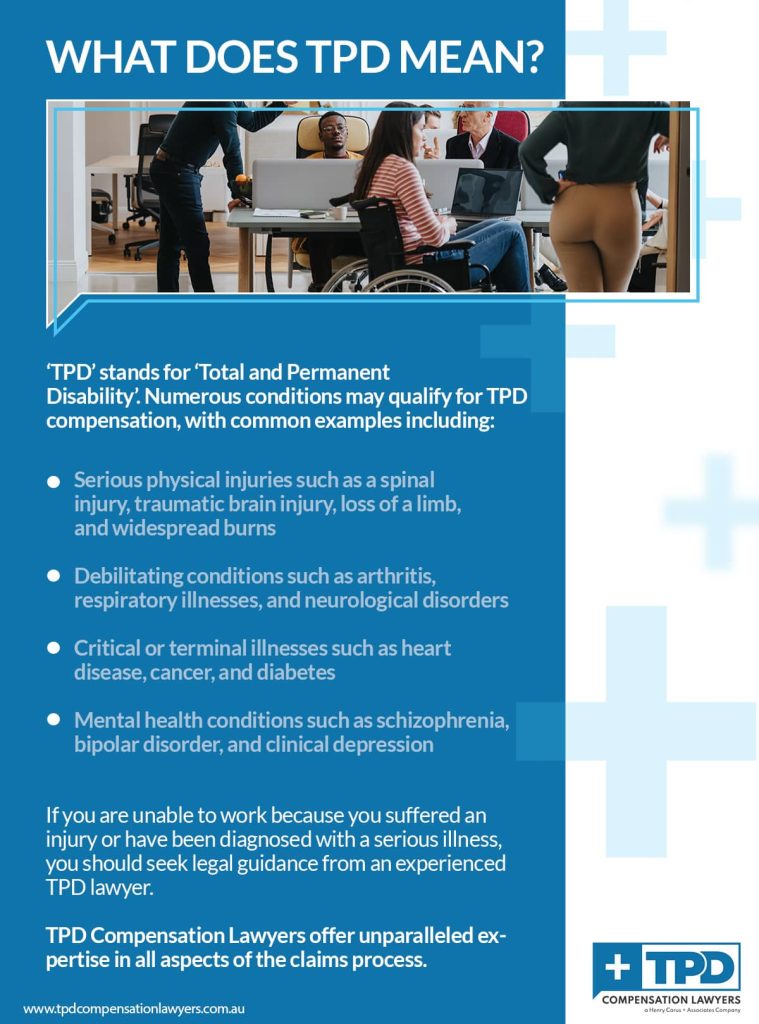What Does TPD Mean?
‘TPD’ stands for ‘Total and Permanent Disability’. It refers to a type of insurance cover that pays you a lump sum benefit if you can no longer work due to an illness or injury. Those who find themselves in this situation may ask, ‘what does TPD stand for?’ A better question, though, is: ‘Am I entitled to a TPD payout?’
At TPD Compensation Lawyers, we focus exclusively on Total and Permanent Disability claims. Our team take the time to evaluate your insurance cover, determine whether you meet the eligibility criteria, and advise you how much your claim may be worth.
Call 03 9966 7188 today for a FREE consultation. Our specialist TPD lawyers serve clients in Melbourne and throughout Victoria.
What Does TPD Cover You For?
As the name suggests, TPD insurance provides a financial benefit if you are totally and permanently disabled. Compensation is generally paid as a lump sum. To qualify for TPD cover, you will need to show that you meet the insurer’s definition of Total and Permanent Disability.
What Are the Three Types of TPD Definitions?
Most TPD insurers use one of two different definitions:
- Any Occupation: Disability is considered total and permanent if you are unable to perform any employment for which you would otherwise be qualified. This is the definition used by superannuation insurance companies.
- Own Occupation: A less restrictive definition sometimes used outside of super, you are entitled to a TPD benefit if you can no longer do the job you had prior to disability.
Some TPD insurers use a third definition that considers Total and Permanent Disability in light of the impact on your day-to-day life. This is known as Activities of Daily Living cover. It is the least likely to pay out of any TPD insurance policies, as a benefit is only paid if you are completely unable to perform certain everyday tasks.

Is It Worth Having TPD?
The question of whether you need TPD insurance is something only you can answer. Key considerations include your health, how dangerous your line of work is, your financial obligations, whether you can draw on savings and other resources in the event of an emergency, how many dependents you have, and more.
Most Aussies who have TPD cover are insured through their employer’s superannuation fund. That means you may have TPD insurance through your employer without even knowing it.
For those not enrolled in an employer-sponsored super fund, it is worth deciding whether to purchase TPD insurance directly. Consider your personal and financial circumstances, and the potential consequences of a Total and Permanent Disability. You may also want to seek advice from a financial professional before making a decision.
What Qualifies as TPD?
Critical to the question of ‘what does TPD stand for?’ is whether you meet the eligibility criteria. There are numerous conditions that may qualify for TPD compensation. Common examples include:
- Serious physical injuries such as a spinal injury, traumatic brain injury, loss of a limb, and widespread burns
- Debilitating conditions such as arthritis, respiratory illnesses, and neurological disorders
- Critical or terminal illnesses such as heart disease, cancer, and diabetes
- Mental health conditions such as schizophrenia, bipolar disorder, and clinical depression
Just about any medical complaint may result in Total and Permanent Disability if it’s serious enough. If you are unable to work because you suffered an injury or have been diagnosed with a serious illness, you should seek legal guidance from an experienced TPD lawyer.
Contact TPD Compensation Lawyers for FREE Today
How Much Is the Total & Permanent Disability Payment?
This is a difficult question to answer without knowing the specifics. One of the first factors to consider is the sum insured (also known as the amount covered or the policy limit). This is the maximum amount that the TPD insurer will pay if you make a claim.
It is also important to consider the type of TPD insurance cover you have. As a rule, TPD benefits through a superannuation fund are lower than payouts from an individual insurance policy. Many TPD policies through superannuation default to age-based cover, which means the entitlement is reduced as you get older. Individual TPD policies, meanwhile, offer customisation that allows for higher payouts in the event of disability.
The terms of the TPD insurance policy also carry significant weight. For example, some insurers may reduce the available benefit or use a different definition of Total and Permanent Disability if you were unemployed or only working part-time before you became disabled.
Finally, having multiple TPD policies means you may be entitled to multiple TPD payouts. The terms of each policy should be carefully reviewed by a knowledgeable legal professional to determine whether you qualify for TPD under one, some, or all of the insurances you hold.
Contact TPD Compensation Lawyers for Help with Your Claim
People are often unsure whether they are eligible for Total and Permanent Disability, let alone how to go about making a claim. TPD Compensation Lawyers offer unparalleled expertise in all aspects of the claims process.
Wondering ‘what does TPD stand for?’ Our team can answer this simple question and so much more, providing you with expert advice and representation throughout the entirety of your claim. We are committed to ensuring that every client gets the maximum payout.
Call TPD Compensation Lawyers at 03 9966 7188 or complete the steps in our FREE claim check tool to get started. Our No Win, No Fee policy guarantees that you pay nothing upfront and only have to pay fees if we are successful.

